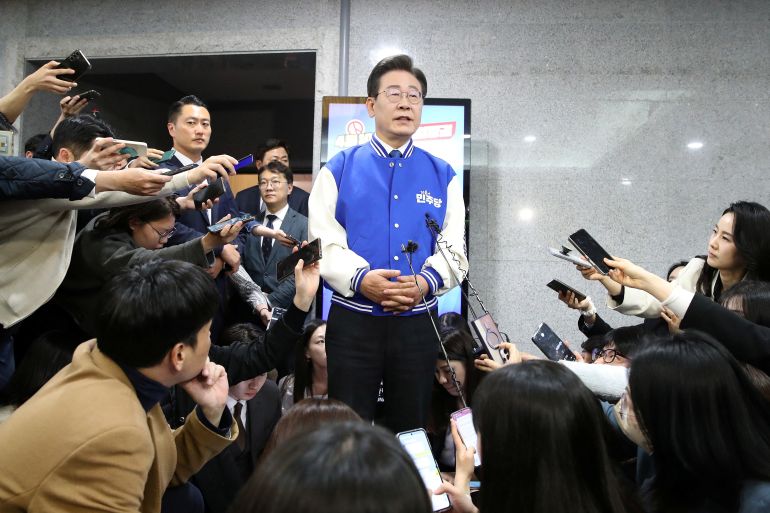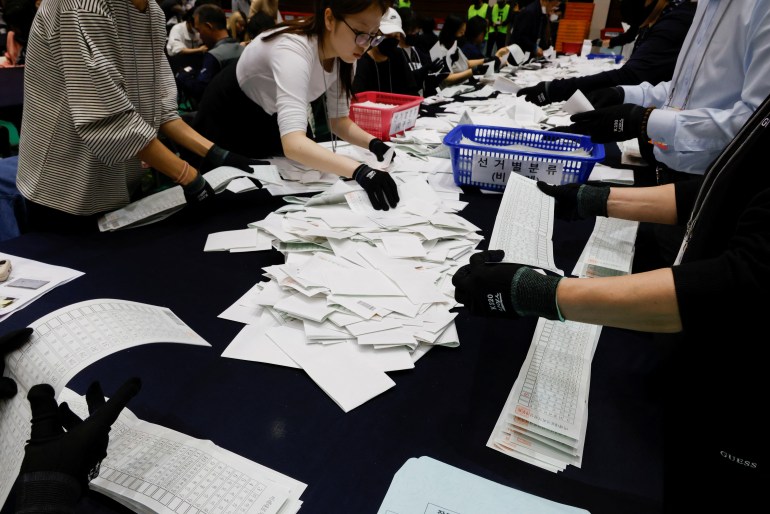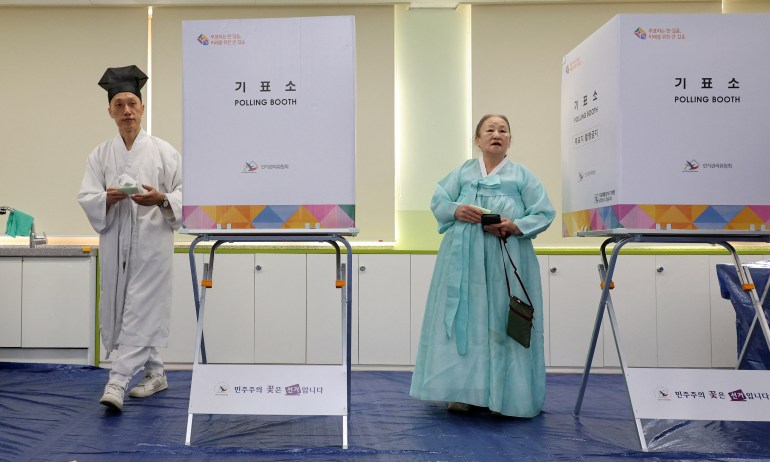South Korea elections: Exit polls show opposition parties increase majority
Parliamentary polls seen as a referendum on President Yoon Suk-yeol amid frustration about cost of living, corruption.

South Korea’s main opposition Democratic Party (DP) and its allies are projected to increase their majority by winning up to 197 seats in the single-chamber, 300-seat legislature, a joint exit poll by three major television networks shows.
Wednesday’s elections were seen as a referendum on President Yoon Suk-yeol as voters expressed frustration about the cost of living and corruption. Voting ended at 6pm (09:00 GMT).
Keep reading
list of 4 itemsSouth Korea puts second military spy satellite successfully into orbit
North Korea fires suspected intermediate-range ballistic missile
South Korea’s Yoon accuses doctors of running ‘cartel’ as strike drags on
The exit poll by TV stations KBS, MBC and SBS suggested that the DP and its allies were forecast to win a combined 183 to 197 seats in the National Assembly.
It also projected that Yoon’s ruling People Power Party (PPP) and its satellite party would win 85 to 100 seats. If confirmed, these results would deal a massive blow to the president and make him a lame duck for his remaining three years in office.
“Certainly one thing is clear: This is not a good night for the president,” said Al Jazeera’s Eunice Kim, reporting from the capital, Seoul.
Counting is still under way across the country, and the election watchdog has said each ballot will be counted twice to ensure nothing is missed, she added.
If the projection holds, the opposition could potentially win more than 200 seats, which would give it a super majority in the National Assembly, Kim reported.
Rebuilding Korea, a liberal splinter party led by former Justice Minister Cho Kuk, was also forecast to secure 12 to 14 seats, according to the exit poll, for which nearly 360,000 voters were interviewed nationwide.

The Yonhap news agency reported that voter turnout was the highest in 32 years with 29.6 million people, or 67 percent of the 44.2 million eligible voters, casting ballots. It cited figures from the National Election Commission just after polling stations closed. Turnout in 1992 was 71.9 percent.
It would mark the highest ever turnout for a parliamentary election, but the numbers were down from the 2022 presidential vote, which narrowly brought Yoon to power.
South Korea’s 254 parliament members are elected through direct votes in local districts and the 46 other seats are allotted according to party support.
Yoon, who narrowly beat the DP’s Lee Jae-myung in the presidential race in 2022, has struggled to push through his conservative policies and is under pressure over a weeks-long doctors strike, which has forced operations to be cancelled.
He is unpopular as a result of the “lack of real progress on domestic political and economic issues”, Andrew Yeo, a politics professor at the Catholic University of America, told the Agence France-Presse (AFP) news agency. “Prices and inflation remain high, housing is expensive and political polarisation remains high.”
Corruption and disaffection
Moon Chung-in, a professor at Yonsei University, told Al Jazeera that the possible opposition landslide victory “is quite surprising” because it was expecting to win a narrow majority of 151 seats.
Moon said the president’s leadership style also did not help during the campaign, adding that he has failed to deliver on his campaign promises of national unity and consensus.
The DP has a majority in the outgoing assembly and has criticised Yoon and his conservative PPP for mismanaging the economy and failing to rein in inflation.

PPP leader Han Dong-hoon, meanwhile, said a big win by the DP, whose leader is facing corruption charges, would create a crisis for the country.
Rebuilding Korea has emerged as a dark horse and is projected to win at least a dozen seats despite offering few substantive policies.
“I am going to make President Yoon first a lame duck, then a dead duck,” Cho told AFP this month.
Cho is himself facing jail time for corruption charges that he denies.
Lee is also on trial for fraud while Yoon has been embroiled in a scandal over his wife’s decision to accept a designer Dior bag as a gift and the appointment of a former defence minister as South Korea’s ambassador to Australia while he was under investigation for corruption.
Before the elections, analysts said demographics could help Yoon as voters aged 60 and older – seen as more conservative – now outnumber those in their 20s and 30s.
Many younger voters are less likely to vote with many saying they are put off by a political class dominated by older men who ignore their concerns.
They are also struggling economically with cut-throat competition in education, fewer job opportunities and sky-high housing costs.
Yoon has three more years to serve of his single term in office. The National Assembly will serve a four-year term.